
Cyprus, officially the Republic of Cyprus, is an island country in the eastern Mediterranean Sea. It is geographically a part of West Asia, but its cultural ties and geopolitics are overwhelmingly Southeast European. Cyprus is the third largest and third-most populous island in the Mediterranean. It is east of Greece, north of Egypt, south of Turkey, and west of Lebanon and Syria. Its capital and largest city is Nicosia. The northeast portion of the island is de facto governed by the self-declared Turkish Republic of Northern Cyprus.
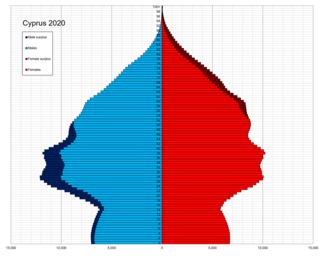
The people of Cyprus are broadly divided into two main ethnic communities, Greek Cypriots and Turkish Cypriots, who share many cultural traits but maintain distinct identities based on ethnicity, religion, language, and close ties with Greece and Turkey respectively. Before the dispute started in 1964 the peoples of Cyprus were dispersed over the entire island.

Demographic features of the population of Turkey include population density, ethnicity, education level, health of the populace, economic status, religious affiliations and other aspects of the population.
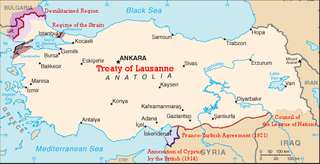
The Treaty of Lausanne is a peace treaty negotiated during the Lausanne Conference of 1922–23 and signed in the Palais de Rumine in Lausanne, Switzerland, on 24 July 1923. The treaty officially resolved the conflict that had initially arisen between the Ottoman Empire and the Allied French Republic, British Empire, Kingdom of Italy, Empire of Japan, Kingdom of Greece, Kingdom of Serbia, and the Kingdom of Romania since the outset of World War I. The original text of the treaty is in English and French. It emerged as a second attempt at peace after the failed and unratified Treaty of Sèvres, which had sought to partition Ottoman territories. The earlier treaty, signed in 1920, was later rejected by the Turkish National Movement which actively opposed its terms. As a result of the Greco-Turkish War, İzmir was reclaimed, and the Armistice of Mudanya was signed in October 1922. This armistice provided for the exchange of Greek-Turkish populations and allowed unrestricted civilian, non-military passage through the Turkish Straits.

Ankara Province (Turkish: Ankara ili, pronounced[ˈaŋkaɾaiˈli], is a province and metropolitan municipality of Turkey with the capital city Ankara. Its area is 25,632 km2, and its population is 5,782,285.
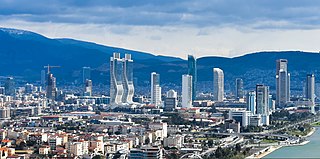
İzmir Province is a province and metropolitan municipality of Turkey in western Anatolia, situated along the Aegean coast. Its capital is the city of İzmir, which is in itself composed of the province's central 11 districts out of 30 in total. To the west, it is surrounded by the Aegean Sea, and it encloses the Gulf of Izmir. Its area is 11,891 square kilometres, and its population is 4,462,056 (2022). Neighboring provinces are Balıkesir to the north, Manisa to the east, and Aydın to the south. The traffic code of the province is 35.

Afyonkarahisar Province, often shortened to Afyon Province, is a province in western Turkey. Its area is 14,016 km2, and its population is 747,555 (2022). The provincial capital is Afyonkarahisar.
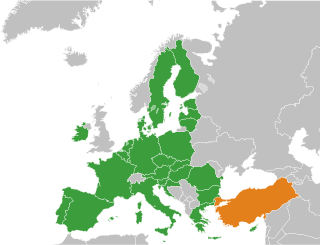
Turkey is negotiating its accession to the European Union (EU) as a member state, following its application to become a full member of the European Economic Community (EEC), the predecessor of the EU, on 14 April 1987.

Bingöl Province is a province of Turkey. The province was known as Çapakçur Province before 1945 when it was renamed as Bingöl Province. Its area is 8,003 km2, and its population is 282,556 (2022). The province encompasses 11 municipalities, 325 villages and 693 hamlets.

Adıyaman is a city in southeastern Turkey. It is the administrative centre of Adıyaman Province and Adıyaman District. Its population is 267,131 (2021). The inhabitants of the city are mostly Kurdish.

Istanbul is the largest city in Turkey, straddling the Bosporus Strait, the boundary between Europe and Asia. It is considered the country's economic, cultural and historic capital. The city has a population of over 15 million residents, comprising 19% of the population of Turkey, and is the most populous city in Europe and the world's fifteenth-largest city.
Ağaçören, formerly Panlı, is a town in Aksaray Province in the Central Anatolia region of Turkey. It is the seat of Ağaçören District. Its population is 2,878 (2021). Its average elevation is 1,100 m (3,609 ft). The town consists of the quarters Camili, Gümüştepe, Kale, Yeni, Yurtsever and Zafer.

Turkey, officially the Republic of Türkiye, is a country mainly in Anatolia in West Asia, with a smaller part called East Thrace in Southeast Europe. It borders the Black Sea to the north; Georgia, Armenia, Azerbaijan, and Iran to the east; Iraq, Syria, and the Mediterranean Sea to the south; and the Aegean Sea, Greece, and Bulgaria to the west. Turkey is home to over 85 million people; most are ethnic Turks, while ethnic Kurds are the largest ethnic minority. Officially a secular state, Turkey has a Muslim-majority population. Ankara is Turkey's capital and second-largest city. Istanbul is its largest city, and its economic and financial center, as well as the largest city in Europe. Other major cities include İzmir, Bursa and Antalya.
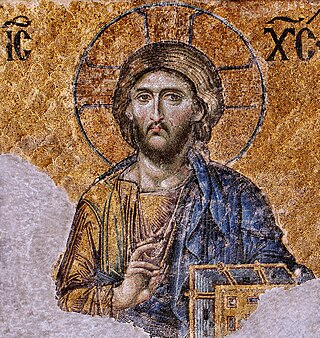
Christianity in Turkey has a long history dating back to the early origins of Christianity in Asia Minor during the 1st century AD. In modern times the percentage of Christians in Turkey has declined from 20 to 25 percent in 1914 to 3–5.5 percent in 1927, to 0.3–0.4%, roughly translating to 200,000–320,000 devotees. The percentage of Christians in Turkey fell mainly as a result of the late Ottoman genocides: the Armenian genocide, Greek genocide, and Assyrian genocide, the population exchange between Greece and Turkey, the emigration of Christians that began in the late 19th century and gained pace in the first quarter of the 20th century, and due to events such as the 1942 Varlık Vergisi tax levied on non-Muslim citizens in Turkey and the 1955 Istanbul pogrom against Greek and Armenian Christians. Exact numbers are difficult to estimate as many former Muslim converts to Christianity often hide their Christian faith for fear of familial pressure, religious discrimination, and persecution.
Aktaş is a village in the Amasya District, Amasya Province, Turkey. Its population is 50 (2021).
Boğaköy is a village in the Amasya District, Amasya Province, Turkey. Its population is 710 (2021).
Fındıklı, called Foundouklia before the 1923 population exchange between Greece and Turkey, is a neighbourhood of the city Amasya, Amasya District, Amasya Province, Turkey. Its population is 524 (2021).
Sarıkız is a village in the Amasya District, Amasya Province, Turkey. Its population is 248 (2021).
Yeniköy is a neighbourhood of the city Amasya, Amasya District, Amasya Province, Turkey. Its population is 422 (2021).
Şeyhsadi is a village in the Amasya District, Amasya Province, Turkey. Its population is 313 (2021).












